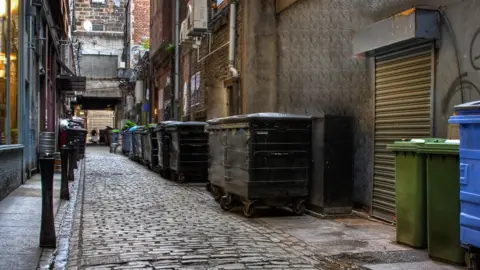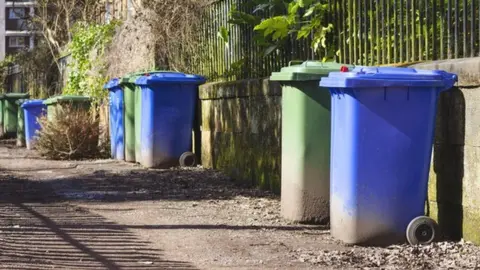Glasgow bin workers confirm strike during COP26
 Getty Images
Getty ImagesCleansing staff in Glasgow have confirmed they will strike for a week during the COP26 climate summit.
Members of the GMB union voted to strike last week and gave local authority body Cosla until Monday to table an improved pay offer.
When this was not made, the union confirmed a week-long strike beginning on 1 November, the first full day of the UN climate change summit.
Cosla said it would continue with constructive negotiations.
Glasgow City Council urged the workers to think again about causing disruption during a "busy and difficult time" for the city.
About 1,500 Glasgow City Council staff in refuse, cleansing, school janitorial and catering roles could walk out in the ongoing pay dispute.
GMB members rejected an £850-a-year increase for staff earning up to £25,000 a year from local authority umbrella body Cosla.
The GMB, along with with Unison and Unite unions, are calling for a £2,000 pay rise for staff.
'Spruce up the city'
Their call for industrial action came after council leader Susan Aitken was criticised for saying the city needed a "spruce up" before the conference.
The union denied workers were using the global climate conference as a bargaining chip but said staff had been "put in a corner" by Cosla despite their efforts during the pandemic.
 Getty Images
Getty ImagesGMB's Scotland senior organiser Drew Duffy said: "Following Cosla's failure to table an improved pay offer for our local government workers, GMB has served Glasgow City Council with statutory notice for industrial action in the cleansing service.
"This will be a seven-day strike action, starting at 00:01 hours on Monday 1 November and ending at 23:59 hours on Monday 8 November, coinciding with the COP26 International Climate Conference.
"Further notices will be served on more councils later this week. If strike action is to be avoided, then a significantly improved offer must be brought forward to give our key workers proper value."
Glasgow City Council urged the union to think again.
A spokesman said: "These are national, rather than local, pay negotiations and it is difficult to understand why this step has been taken while those negotiations remain ongoing.
"COP will undoubtedly be a busy and difficult time for the city and its residents. Holding this action only in Glasgow at this time will have disproportionate and unfair local impact in pursuit of a national campaign. We urge them to think again about the timing of this."
Glasgow is the largest of five councils in Scotland currently planning strikes. 96.9% of returned ballots in Glasgow were in favour of industrial action.
'Constructive negotiations'
A spokesman for Cosla said: "We appreciate everything that local government workers have been doing, and continue to do, to support people and communities during the pandemic and as we begin to recover.
"We continue with on-going constructive negotiations."
The strikes are not the first to be announced for the COP26 summit, when the eyes of the world will be on the city.
About 120 world leaders and 25,000 delegates will be presented with a city where rail services are cancelled and cleaners and refuse collectors are out on strike.
Workers and unions have threatened walk outs during the gathering from 31 October to 12 November.
Rail workers are also set to go on strike during the summit, in a separate dispute from the RMT union over pay and conditions.
ScotRail staff will strike from Monday 1 November until Friday 12 November.
Staff on the Caledonian Sleeper will hold two 24-hour strikes. One from 11:59 on Sunday 31 October and one on Thursday 11 November.
And Unite Scotland has also said about 1,000 workers across the Stagecoach Group had backed strike action at the end of October which would affect COP26 bus travel in central Scotland.

The COP26 global climate summit in Glasgow in November is seen as crucial if climate change is to be brought under control. Almost 200 countries are being asked for their plans to cut emissions, and it could lead to major changes to our everyday lives.

